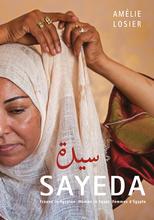SAYEDA
SAYEDA
Frauen in Ägypten. Women in Egypt. Femmes d‘Égypte
Frauen in Ägypten. Women in Egypt. Femmes d‘Égypte
auf zwei Papiersorten
Breitklappenbroschur, Fadenbindung
ISBN 978-3-03850-037-7
deutsch, english, français
EUR 14.80
Wie in vielen arabischen Umbruchländern ist die Gesellschaft in Ägypten tief gespalten: Hier die revolutionäre Sehnsucht nach westlicher Prägung; dort das Streben nach streng-religiöser Restauration; dazwischen das Militär, das sich die zentrifugale Situation zunutze macht, um ein neues autokratisches Regime zu installieren. Teilweise verdeckt von den machtpolitischen Auseinandersetzungen gewinnt ein grundlegender Konflikt an Bedeutung: derjenige zwischen den Geschlechtern. Auch wenn die wenigen Frauenrechtlerinnen noch kaum Gehör finden, so ist die Botschaft dennoch klar: Solange die Rechte der Frauen mißachtet werden, kann es keinen wirklichen gesellschaftlichen Fortschritt geben.
Vor diesem Hintergrund ist die Fotografin Amélie Losier mehrfach nach Ägypten gereist, um mit der Kamera der Frage nachzugehen: Was bedeutet es heute, eine Frau in Ägypten zu sein? Sie hat Frauen aller sozialen Schichten und Altersgruppen getroffen: verheiratete und unverheiratete, religiöse und säkulare, städtische und ländliche, verschleierte und unverschleierte, Frauen mit und ohne berufliche Ausbildung. Sie hat sie porträtiert und interviewt, war bei ihnen zu Hause und mit ihnen unterwegs auf den Straßen. Ihre Fotos und Interviews geben einen tiefen, facettenreichen Einblick in eine Welt jenseits der gängigen politischen Nachrichten.
Ergänzt wird der Bildband mit Texten der Politikwissenschaftlerin Hoda Salah und der Kunstwissenschaftlerin Franziska Schmidt.
La société égyptienne, comme celle de nombreux autres pays arabes, est aujourd’hui profondément divisée, avec d’un côté la volonté de se rapprocher du modèle occidental, de l’autre une tendance à la restauration du fondamentalisme religieux, et entre les deux l’armée qui a su tirer profit de forces centrifuges pour instaurer un nouveau régime autocratique. Dans ce contexte, un nouveau conflit se fait jour, bien qu’il soit encore partiellement occulté par les tensions politiques : le conflit entre les sexes. En dépit du peu d’attention dont les militantes féministes bénéficient en Égypte, leur message est on ne peut plus clair : il n’y aura pas de véritable progrès social tant que les droits des femmes ne seront pas respectés. La photographe Amélie Losier s’est rendue sur place à plusieurs reprises afin de répondre à la question : qu’est-ce que cela signifie d’être une femme aujourd’hui en Égypte ? Elle a rencontré des femmes de tous les âges et de toutes les classes sociales, des célibataires et des femmes mariées, qui vivent à la ville ou à la campagne, portent le voile islamique ou non et ont différents niveaux d’éducation. Elle les a interviewées et photographiées chez elles, et dans la rue. Par leur profondeur et leur grande diversité, ces portraits en texte et en images rendent ainsi compte de la société égyptienne d’une manière radicalement différente de celle véhiculée par la presse.
Les photos et interviews se complètent par une introduction due à de la politologue Hoda Salah et un essai de l’historienne de l’art Franziska Schmidt.
As in many Arab countries engulfed in political turmoil, Egyptian society is deeply divided: here the revolutionary pursuit of western ideals; there the striving for religious orthodoxy; and in between the military, which has taken advantage of its centrifugal position to install a new autocratic regime. Partially obscured by the political disputes, one fundamental conflict is nonetheless growing in significance: the conflict between the sexes. Although the country’s few feminists are given scant attention, their message is clear: as long as the rights of women are ignored, there can be no real progress in society. Against this background, the photographer Amélie Losier made numerous trips to Egypt with her camera to try and answer the question: What does it mean to be a woman in Egypt today? She met women of all ages and from all social backgrounds: married and unmarried, religious and secular, urban and rural, veiled and unveiled, educated and uneducated. She portrayed and interviewed them, visited them in their homes, and spent time with as they went about their daily lives. Her photos and interviews provide a profound and multifaceted insight into a world beyond the political headlines. The photos in the book are accompanied by texts by the political scientist and Islam expert Hoda Salah and the art historian and photography specialist Franziska Schmidt.






